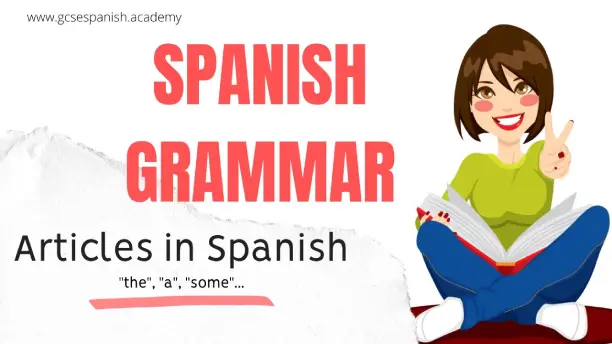Let’s see how articles in Spanish work. Notice that, in Spanish, «the» and «a» change depending on the gender of the noun and whether it’s singular and plural.
We will start by watching a video that will give you a clear picture of articles in Spanish.

Let’s review everything we have seen in the previous video.
"El", "la", "los" and "las" are DEFINITE ARTICLES
- The word for «the» changes, in Spanish, depending on the gender of the noun, and whether it’s singular or plural: el árbol (tree), la flor (flower), los árboles (trees), las flores (flowers)…
- Use «el» before feminine nouns which start with a stressed «a»: El agua está fría (the water is cold), el águila es hermosa (the eagle is beautiful)…
- Sometimes you need a definite article in Spanish where you wouldn’t use one in English…
- with nouns used in a general sense: No me gusta el café (I don’t like coffee).
- in front of the days of the week and times: Los martes a las 9:00 de la mañana (Tuesdays at 9:00 in the morning).
- in front of weights and measurements: Cuesta 10 euros el kilo (It costs 10 euros a kilo).
- when you use a person title: ¿Cómo está la Sra López? (How is Mrs López?).
- There’s a neuter article «lo» for things that aren’t masculine or feminine: lo mejor es que... (the best thing is that…). When you use «lo» in front of an adjective, the adjective has to be in the masculine form: lo bueno es que (the good thing is that…).
"Un", "una", "unos" and "unas" are INDEFINITE ARTICLES
- «Un» and «una» mean «a«. «Un» is used for masculine words and «una» is used for feminine words: un libro (a book), una pizarra (a blackboard)…
- When you make «un» or «una» plural, they become «unos» and «unas«, meaning «some» or «a few«: unos libros (some books), unas pizarras (some blackboards)…
- Watch out, though «a» is left out...
- after the verb «ser» when talking about someone’s occupation or nationality: Mi padre es abogado (my father is a lawyer).
- after a negative verb: No tengo mascota (I haven’t a pet).
"Any", "another", "each" and "all" are indefinite adjectives
- In Spanish, there’s no especial word for «any«: ¿Tienes manzanas? (Have you got any apples?).
- Use «otro» or «otra» for «another«: Lo haré otro día (I will do it another day). Don’t write «un» or «una before «otro/a»!
- «Cada» means «each«. It is the same for masculine and feminine nouns: Cada verano voy a Mallorca (Every Summer I go to Majorca). Cada primavera pintamos nuestra casa (Every Spring we paint our house).
- Todo/toda/todos/todas means «all»: Visitaron todos los museos de la ciudad (They visited all the museum in the city). Usamos todas las manzanas en la tarde (We use all the apples in the cake).
Now, it is time you put into practice everything you have learned with some exercises. Click on the button below to access them.

